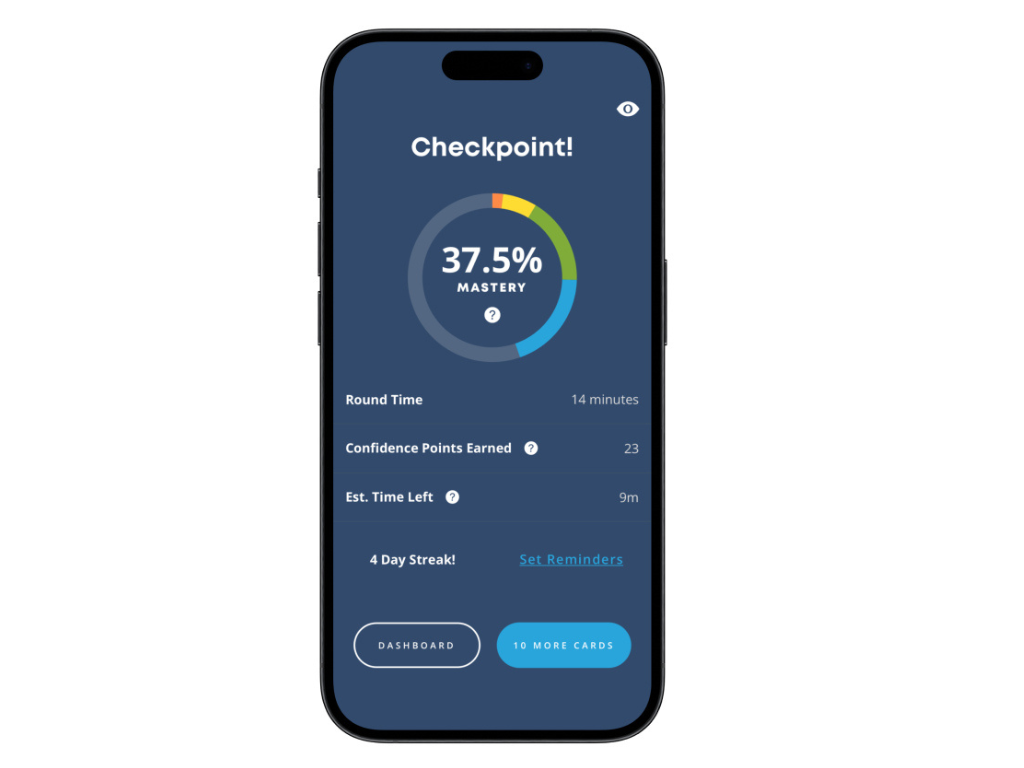Flashcards are a classic study tool, as beloved as they are simple. They can help you memorize complex theories, endless vocabulary, and the kind of declarative facts that pop up in exams. But are they the magical answer to all your study woes? Well, let’s not get too carried away.
Flashcards are great for adaptive learning, but they aren't necessarily the most effective learning strategy for more practical, hands-on skills... and it's worth knowing this before you try to apply them to your, your kids', or students' learning.
Below, we’ll break down the disadvantages of flashcards and how to avoid the common mistakes that might keep you from reaching your study goals as efficiently as possible. You can also watch this short YouTube video for all the "tea"...
(Read: The complete guide to making & studying flashcards online)
The disadvantages of flashcards: They don't teach you subjects from scratch
Flashcards shouldn't be used as a tool to learn subjects from scratch. Rather, they reinforce (and deeply ingrain) information you've already been exposed to in textbooks, lectures, or notes. In other words, they are an adaptive learning tool that bridges the gap between understanding what you’re hearing or reading and being able to explain it yourself, from your memory.
Imagine trying to learn a brand-new language using only flashcards. Without grammar rules or sentence structure, you’d sound kinda funny in conversation, wouldn’t you?
“Bathroom. Where?”
"This. How much?"
"Me. Like. You. Yes. Happy."
Sure, you could get around a foreign country, but would you thrive in conversation? Probably not.
Flashcards reinforce information, but they don’t teach you the skill of using it the same way real-world, hands-on practice does.
You’ll need those primary sources to actually understand what you’re studying. Use flashcards as an adaptive learning tool to etch concepts into your memory—not to replace your textbooks.
Check out our complete online toolkit for language learning.
The disadvantages of flashcards: strong on declarative knowledge, not so much with procedural knowledge
Flashcards are unbeatable for acquiring and ingraining declarative knowledge (think: facts, terms, and definitions), but they’re not quite as helpful for procedural knowledge—things you learn by doing, like playing an instrument or solving complex math problems.
Sure ( C( you could use flashcards to test whether you remember the steps in a math formula, but they won’t actually help you solve the unpredictable problem sets you get in an exam. That said, they can still serve as helpful checkpoints and especially for learning the underlying theory.
(For more detail, check out our guide on learning math with flashcards.)
For example, you can’t use flashcards as a substitute for guitar practice. But the advantage of using flashcards in this context is that you can use them to guide your practice by testing your ability to play certain chords, runs, and songs in your repertoire.
Try this: write the chord or name of the song on the question side of the flashcard and leave the answer side blank. Then, when you come across the flashcard, play the chord or song and then sort that flashcard depending on how well you did.
In the digital flashcard app Brainscape, you’re required to rate how well you know a flashcard on a scale of 1 to 5, with 1 being “not at all” and 5 being “perfectly”. So if you suck at playing that chord or song, you can rate yourself a 1 or 2. But if you rock it, then score yourself a 4 or 5.

The app will then repeat that flashcard based on how well you did: more often if you sucked and less often if you rocked. This way, Brainscape drills you on the chords or songs you’re weakest in, efficiently guiding your skill-based practice and helping you to make faster progress!
This is one way you CAN use a free flashcard maker to help you improve procedural knowledge! But as a rule, they’re much more powerful tools for learning declarative knowledge.
So are flashcards all you need? Check out our guide on how they fit into the bigger picture of your learning strategy.
The disadvantages of flashcards: Some people, ah, overestimate their confidence
One of educators' biggest concerns with confidence-based repetition is that students might try to get ahead by overrating how well they know each concept. (In Brainscape, this might look like rating a flashcard a 5 when, in reality, your confidence in that concept was probably closer to a 3.)

Is it any surprise, though? Modern education feels like a battleground. Everyone’s competing for the highest mark to get their foot in the next door! We’re taught pretty mercilessly from childhood that we need to score full marks to succeed: we want that 5 rating. But this isn’t how flashcards work. You need to rate your understanding of each concept honestly.
Thankfully, a free flashcard maker like Brainscape is designed to overcome this tendency. Imagine Overconfident Oscar is handing himself 4s and 5s like Halloween candy. Suddenly, the algorithm throws him a card he previously rated a 5 and he realizes, “Dang, I don’t remember the answer to this.”
This forces him to eat major crow.
Realizing his boo-boo, he’ll not only process the memory of that concept more deeply, but he’ll also learn to more objectively scrutinize his confidence in every additional concept going forward.
Cognitive science shows that a learner's discovery of their previous overconfidence actually deepens their memory trace more than if they’d actually been 100% accurate in their assessment in the first place! To avoid this, don’t be too quick to give yourself a high rating. Rate your confidence honestly, and remember that the best study sessions are the ones in which you’re actively challenging yourself.
Text-only flashcards can get old … but Brainscape keeps it exciting!
Let’s face it: staring at plain, text-only flashcards can feel like running on a treadmill—it works, but it’s not exactly thrilling. Paper flashcards, in particular, lack variety and can lead to boredom but here’s the good news: digital flashcard apps like Brainscape completely change the game.
So, what are the advantages of using flashcards from Brainscape?
Brainscape’s digital flashcards let you add audio and images to your cards, turning a simple study session into an engaging, interactive experience. Imagine reviewing biology concepts with diagrams or listening to foreign language pronunciations, testing yourself against multiple media within the same flashcard collection!
Not only that, Brainscape’s sleek interface and progress metrics keep you motivated with frequent checkpoints and feedback that show you exactly how much closer you are to mastering your material. The result? Studying feels less like a chore and more like an accomplishment.

Ditch the dullness of paper flashcards and experience the vibrant, multimedia-rich world of Brainscape. Studying has never been so efficient—or so much fun.
Which subjects are flashcards best for learning?
Flashcards are best for content/fact-heavy subjects like history, geography, vocabulary, biology, law, and more. In other words, they’re incredibly effective at helping you memorize a lot of information in a short amount of time. Think: complex theories, vocabulary, and the kind of declarative facts that pop up in written exams.
So, for any subject that has a lot of content you need to learn and remember, lean on flashcards!
In fact, flashcards—especially digital ones with built-in spaced repetition algorithms—are scientifically proven to help you learn TWICE as fast as traditional study methods.
Digital flashcards go beyond the basics, leveraging active recall to force your brain to retrieve information from memory, strengthening your neural pathways in the process. Plus, with spaced repetition built in, apps like Brainscape strategically show you cards right before you’re likely to forget them, ensuring that every study session locks your knowledge deeper into long-term memory.
Brainscape’s interactive flashcards even take it a step further, allowing you to rate your confidence on each card. The app’s algorithm adjusts your study plan based on your mastery, focusing your time on what you don’t know and saving time on what you’ve already aced.
This personalized approach makes learning faster and smarter by only showing you content in your optimized learning zone. If y
Check out this video for more tips on the fastest way to learn:
The verdict on flashcards
Flashcards are a brilliant way to test your knowledge and strengthen recall, but they’re not a one-size-fits-all solution. Use them wisely, alongside other learning methods, and always remember that they’re meant to complement—not replace—your primary sources of study. (For a flashcard app that's scientifically optimized to help you learn as fast as humanly possible, check out Brainscape.)
So next time you reach for those flashcards, remember: they’re powerful, but only as part of a well-rounded study strategy. Keep challenging yourself, stay curious, and happy studying!
Sources
- Butterfield, B., & Metcalfe, J (2006). The correction of errors committed with high confidence. Metacognition and Learning, 1(1), 69-84.
- Karpicke, J. D. (2012). Retrieval-based learning: Active retrieval promotes meaningful learning. Current Directions in Psychological Science, 21(3), 157-163.
- McLeod, S. (2024) Vygotsky’s zone of proximal development, Simply Psychology - Vygotsky’s Zone Of Proximal Development. Available at: https://www.simplypsychology.org/zone-of-proximal-development.html
